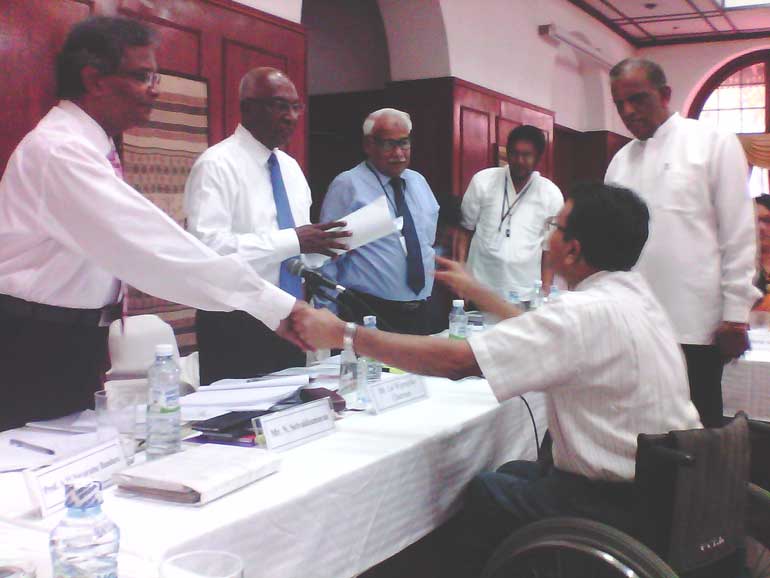Tuesday Feb 24, 2026
Tuesday Feb 24, 2026
Monday, 25 January 2016 00:00 - - {{hitsCtrl.values.hits}}

Differently-abled rights activist Dr Ajith Perera presenting his proposals to the Constitution Reform Committee Chairman Lal Wijenayake and Secretary Winston Pathiraja
The Committee appointed by the Government to seek public opinions on proposed reforms to the Constitution, commenced work in Colombo last Monday under the leadership of senior lawyer Lal Wijenayake.
Obtaining oral and written public views in Colombo continued until 4.30pm on Friday 22nd January at its secretariat at Visumpaya, Staples Street, Colombo – 02.
This committee aims to compile views and suggestions made both orally and as written submissions from the public from all over the country.
Dr Ajith C. S. Perera – the eminent differently-abled rights activist was amongst the first few to make both oral and written submission on Monday, concerning the rights of the people with restricted ability.
Speaking to the media at Visumpaya, Dr Perera said, even the Supreme Court in 2011 had accepted the fact that people with restricted ability are estimated to be not less than 20% of our population. The majority of these are unable by themselves to ensure for themselves, wholly or partly, the necessities of daily life.
Even the Supreme Court had accepted the fact that they form the country’s largest minority.
“We badly need today the ‘Rule of Law’ that goes beyond the nominal existence of legal institutions and policies that gather cobwebs without getting implemented in society.” said Dr Perera
“All citizens, regardless of the degree of ability, require the basic protection enshrined in the Constitution to guaranteeing that ‘no class of persons shall be denied the same rights that are enjoyed by other classes in same society in like circumstances.’
The present Constitution fails to give this protection to the country’s largest minority.
The oral submissions I made and the written proposals presented here today, when implemented will enable Constitutional protection to empower people of ALL ABILITIES in preventing being downtrodden as third class citizens due to their abilities being restricted. Instead they will be guaranteed enjoyment of democratic rights they are entitled to in day-to-day life, to a meaningful degree. This will give life to their lifeless disability rights so that regardless of the degree of one’s ability, everyone could equally integrate into society for full participation in all spheres of daily life as useful and equal partners with dignity and safety”.